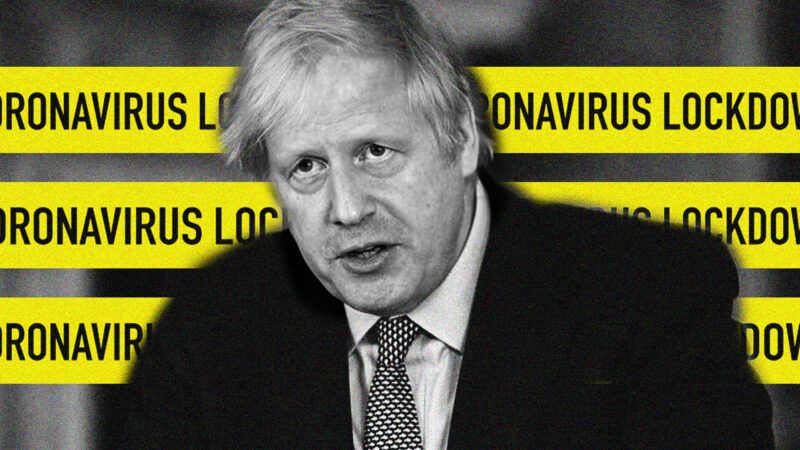The UK Beat COVID-19, But Can It Beat Lockdowns?
Even with coronavirus deaths at a trickle, Prime Minister Boris Johnson won’t rule out more lockdowns.

Sixteen months on from our first recorded COVID-19 death, Britain finds itself in a paradoxical position: We're finally on the verge of defeating this awful virus—but we haven't yet beaten lockdown.
With 70 percent of Britain's adult population fully vaccinated (and vaccination rates among seniors over 90 percent) daily COVID-19 deaths have slowed to a trickle. Even with a spike in cases thanks to the Delta variant, deaths have hardly budged. Having reopened the indoor economy back in May, we're seen only a small rise in hospitalizations, even if cases have soared.
In short, the vaccines worked.
If you'd have shown these numbers to Prime Minister Boris Johnson six months ago, he would have jumped for joy. But that hasn't been the case. Instead, he and Britain's other political elites find themselves locked in a cycle of hyper-caution. The last COVID-19 rules were finally scrapped on July 19, only to be replaced by guidelines telling us to keep upholding them. Here are your freedoms back, but please don't exercise them.
Things may get worse. Having once called ending lockdown "irreversible," Johnson is now refusing to rule out restrictions this autumn and winter. Less than a week after so-called "freedom day," Britain's chief medical officer (our equivalent of America's Anthony Fauci) is already talking up the prospect of another lockdown. That will only bring more fear and uncertainty to businesses that have endured six months of forced closure.
The problem isn't the Delta variant, it's the top of the government: Johnson himself. After his own near-fatal brush with Covid, our once supposedly libertarian prime minister finds himself reborn as the king of caution and a proud nanny statist. His new mission is not just to save us from any risk of COVID whatsoever but also the things that got us into such a mess in the first place—just look at his deeply illiberal war on junk food and his pledge to make vaccinations compulsory for clubbers.
Listening to a podcast about the George W. Bush presidency last week, I couldn't help but sense some parallels. Like Bush, Johnson came to power as an energetic and modernizing conservative, only to find his plans derailed by a deadly black swan. For Bush, that swan became an obsession that reshaped his entire political philosophy, largely for the worse. I suspect the same has happened to Johnson.
A return to lockdown would be both a moral and economic disaster for Britain. And what could possibly justify it? Self-styled "zero Covid" types (some of whom are favorably quoted in The New York Times) warn that rising hospitalizations will result in serious disruption to Britain's state-run health service. That might prove to be true. But is it really enough to return to the days of criminalizing sitting on park benches and violently dispersing peaceful protests?
Britain has a new problem—not Long Covid, but long lockdown. Once designed as a temporary aberration, authoritarian restrictions are now seen as part of the political toolbox, and not just for COVID-19. If we get a tough flu season this winter, expect to see politicians calling for closing hospitality industries and restrictions on private gatherings. The return of mask mandates (lifted in England but not Scotland and Wales) seems like a safe bet.
All of the arguments for more lockdown can be quickly dismissed, but only if politicians are brave enough to do so. If living with COVID-19 means an increased strain on health services, then we need to fix the problem at the source. Increase healthcare capacity rather than curtailing our freedoms. Maybe that would be cheaper than the cost of lockdowns.
Instead, far too much of our political energy remains focused on managing COVID-19 caseloads instead of declaring victory over COVID-19 deaths. Rather than dealing with the shocking education and health backlogs caused by lockdown, Downing Street is concentrating on defending its test-and-isolate program (a multi-billion pound tech dystopia that has taken millions of workers out of the economy), tightening punitive travel restrictions, and stepping up testing in schools.
Given where we were in January (daily death tolls over 1,000 and Britain back in a full-scale lockdown without an exit date) it all makes for a rather mixed picture. Despite much initial skepticism, Britain's vaccine rollout really was world-leading. Our long lockdown did end, albeit at a slower pace than most of Europe. Having topped the vaccine league, we have now become the first major economy to learn what "living with Covid" really means. (As the saying goes, no good deed goes unpunished).
That's why it's so vital that Britain rediscovers its once-cherished commitment to freedom, and quickly. If we go down the road of permanent restrictions, we could end up setting the model that countries like France, Germany, the Netherlands, and Canada follow. Such a step would be a disaster: not just for the countries concerned, but for liberalism itself.
Here's hoping Boris Johnson can come to his senses and stop that from happening. The U.K has beaten COVID-19. Now let's beat lockdowns, too.


Show Comments (30)